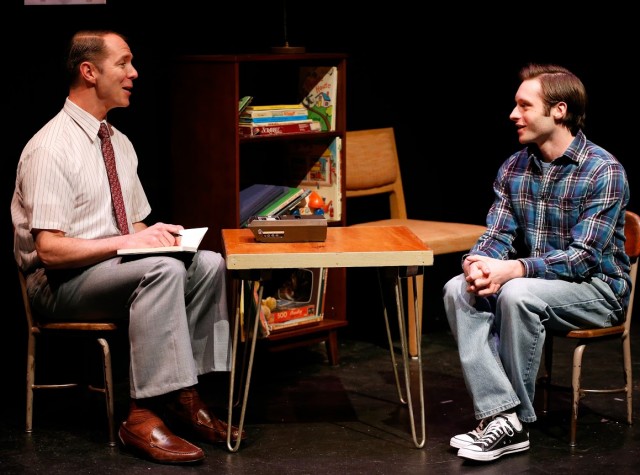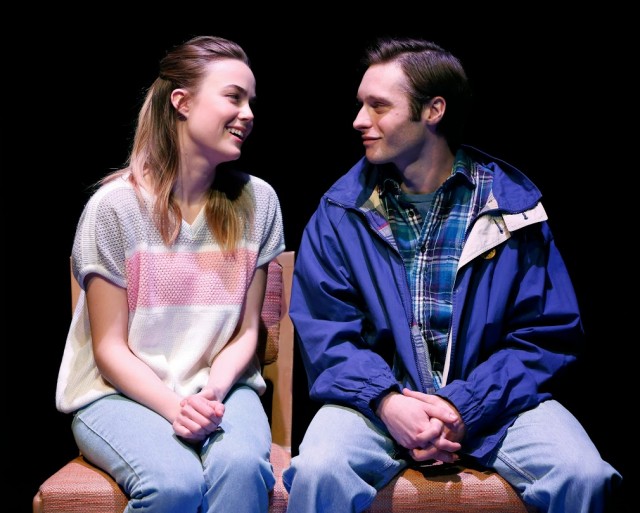
Dr. Wendell Barnes (Paul Niebanck) bonds with Samantha (Bobby Steggert) in Anna Ziegler’s BOY (photo by Carol Rosegg)
The Clurman Theatre at Theatre Row
410 West 42nd St. between Ninth & Tenth Aves.
Tuesday – Sunday through April 9, $62.50
www.keencompany.org
www.ensemblestudiotheatre.org
Award-winning playwright Anna Ziegler takes a unique and imaginative approach to the timely issue of gender identity in the expertly written, inventively staged drama Boy. A joint production of Keen Company and Ensemble Studio Theatre, Boy was inspired by the real-life case of David Reimer as well as the birth of Ziegler’s first child. Bobby Steggert stars as Adam/Samantha, a twin born in Iowa in 1967. Shortly after a botched, unnecessary circumcision accidentally sears off his penis when he is eight months old, his mother, Trudy (Heidi Armbruster), and father, Doug (Ted Koch), seek out the help of eminent physician Wendell Barnes (Paul Niebanck), a doctor in the relatively new field of gender reassignment. “Sam will never lead a normal life. He will never be a father. He will never be normal,” Doug opines in a letter to Dr. Barnes, while Trudy adds, “We saw you on that program and you said that we are blank slates at birth. You said we are shaped by society and not biology.” Dr. Barnes, who is eager to treat the boy, convinces the parents that it is best for the child to be raised as a girl, receiving hormone shots and ultimately an operation to give her a vagina, but he insists that she must never find out that she was born with male genitalia. The play shifts back and forth between various years from 1968 to 1989 as Samantha learns about great literature from Dr. Barnes and Adam falls for a single working mother, Jenny (Rebecca Rittenhouse). Delivering a lecture in 1977, Dr. Barnes explains, “How do we become who we are? Is it a process that takes place entirely within the dark mysteries of the womb, so we emerge fully formed, our character, our future set? Or do we build ourselves, brick by brick, ‘sufficient to have stood though free to fall’? Do we make our house or do we simply inhabit it?” But as Boy shows, there are no easy answers to those questions, whether it’s 1968, 1977, 1989, or today, when such topics as nature vs. nurture and being born a certain way are still rife with controversy.

Jenny (Rebecca Rittenhouse) and Adam (Bobby Steggert) consider a relationship in BOY (photo by Carol Rosegg)
No matter the age, Adam/Samantha wears the same outfit in every scene, reaffirming that what matters is on the inside. Steggert (Mothers & Sons, Ragtime) does a marvelous job of depicting how uncomfortable Adam/Samantha is in his/her own skin, displaying a jittery awkwardness that keeps the audience on edge. Ziegler (The Last Match, A Delicate Ship) fills the play with a wide array of literary and pop-culture references, but each one has a critical connection to the story, from John Milton’s Paradise Lost, Maurice Sendak’s Where the Wild Things Are, and Charlotte Brontë’s Jane Eyre to Robert Zemeckis’s Back to the Future 2 and Marlo Thomas’s Free to Be You and Me. Even when Adam imitates Elmer Fudd, saying, “Shh . . . Be vewwy, vewwy quiet . . . I’m hunting wabbits!,” it relates to Jenny’s first appearance onstage, in a bunny costume at a Halloween party, where Adam quite adamantly tells her that he is not Frankenstein but Frankenstein’s monster. “Frankenstein was the guy who made the monster. I’m just the monster,” he points out. The cast is uniformly excellent, with Armbruster (Time Stands Still, Disgraced) and Koch (The Pillowman, Abundance) bringing just the right confusion to the parents, while Niebanck (A Walk in the Woods, Blood and Gifts) is quietly effective as the doctor who befriends Samantha but also stands to gain fame from their association. And Rittenhouse (The Commons of Pensacola) makes Jenny a kind of onstage representative of the audience, not quite understanding all of what is happening but compelled to find out more about Adam. Evoking such works as John Cameron Mitchell’s Tony-winning Hedwig and the Angry Inch and Emily Bentley Solomon’s award-winning adaptation of Daphne Scholinski’s memoir The Last Time I Wore a Dress, Boy also investigates doctors and parents playing god, which continues as science makes leaps and bounds in genetics. Sandra Goldmark’s living-room set features a close-but-not-exact duplicate of the furniture upside down on the walls and ceiling, as if Adam/Samantha is caught between two worlds, unable to settle into his/her place. Director Linsay Firman (Lucas Hnath’s Isaac’s Eye, Ziegler’s Photograph 51) cleverly navigates through the years, dealing with complex issues concerning traditional gender roles in a gentle, tender manner that threatens to explode at any moment. About halfway through the play, Jenny worries that Adam, who named himself after the first man on earth, is just like all the other men she’s met in her life. “I’m not like them,” he insists. No, he most certainly isn’t.